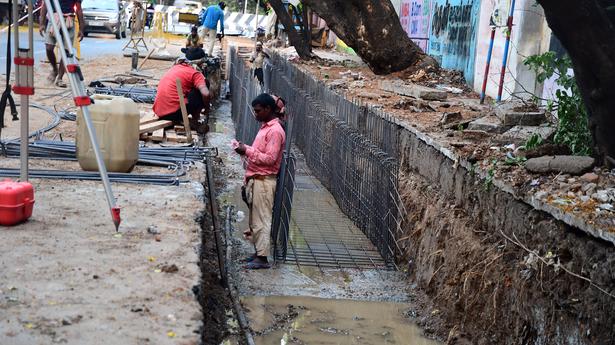
Corporation sets Sept. 30 deadline for completing flood mitigation project
The Hindu
Commissioner issues circular asking officials to strictly monitor the quality of work
As flood mitigation project gains pace in the city, the Greater Chennai Corporation has sent a circular asking its officials to ensure that work on the stormwater drain conformed to the norms in the flood-prone areas of the city.
Setting September 30 as the deadline to complete work along the major stretches ahead of the northeast monsoon, Corporation Commissioner Gagandeep Singh Bedi has instructed all zonal officers, executive engineers and all regional superintending engineers to take precaution. The assistant engineer, the assistant executive engineer and the executive engineer concerned would be held responsible for any water stagnation in the drain after the construction work was completed.
Some residents’ associations had demanded that the levels should be checked to ensure proper draining of stormwater in flooded areas. Stormwater drain running to a length of 1,033 km was being constructed at an estimated cost of ₹4,070 crore. Mr. Singh had been reviewing the progress of work every two days.
“Completion of the stormwater drain, especially in areas where there was flooding in the previous northeast monsoon, is of top most priority to the Corporation. The State Government has already sanctioned Singara Chennai Phase I and Phase II packages for construction of drains, which are predominantly in core city areas such as Teynampet, Kodambakkam and Pulianthope. In all these areas, the work orders were issued in April,” said Mr. Bedi.
“Instructions have been given to undertake the work from the final disposal point and go backwards. At present, work on about 50% to 60% of the roads has been undertaken. The Corporation is not insisting that all the roads be dug up at the same time to avoid inconvenience to the public,” said an official.
The Corporation has issued clear instructions to the contractors on two issues. One was that while digging, damage should not be caused to sewer lines or electrical cables. The Commissioner has repeatedly instructed deputy commissioners and engineers to put up barricades on all stretches that have been dug up, to ensure public safety. “Any lapse in barricading is taken up seriously with the contractors,” said an official.
Design of the drains taken up under Singara Chennai 2.0 has been vetted by IIT Madras. Work in areas like Kolathur has been taken up under the Kosasthalaiyar Basin project. Flood-prone areas such as Jawahar Nagar and GKM Colony would get better drains before September.

“Writing, in general, is a very solitary process,” says Yauvanika Chopra, Associate Director at The New India Foundation (NIF), which, earlier this year, announced the 12th edition of its NIF Book Fellowships for research and scholarship about Indian history after Independence. While authors, in general, are built for it, it can still get very lonely, says Chopra, pointing out that the fellowship’s community support is as valuable as the monetary benefits it offers. “There is a solid community of NIF fellows, trustees, language experts, jury members, all of whom are incredibly competent,” she says. “They really help make authors feel supported from manuscript to publication, so you never feel like you’re struggling through isolation.”

Several principals of government and private schools in Delhi on Tuesday said the Directorate of Education (DoE) circular from a day earlier, directing schools to conduct classes in ‘hybrid’ mode, had caused confusion regarding day-to-day operations as they did not know how many students would return to school from Wednesday and how would teachers instruct in two modes — online and in person — at once. The DoE circular on Monday had also stated that the option to “exercise online mode of education, wherever available, shall vest with the students and their guardians”. Several schoolteachers also expressed confusion regarding the DoE order. A government schoolteacher said he was unsure of how to cope with the resumption of physical classes, given that the order directing government offices to ensure that 50% of the employees work from home is still in place. On Monday, the Commission for Air Quality Management in the National Capital Region and Adjoining Areas (CAQM) had, on the orders of the Supreme Court, directed schools in Delhi-NCR to shift classes to the hybrid mode, following which the DoE had issued the circular. The court had urged the Centre’s pollution watchdog to consider restarting physical classes due to many students missing out on the mid-day meals and lacking the necessary means to attend classes online. The CAQM had, on November 20, asked schools in Delhi-NCR to shift to the online mode of teaching.









